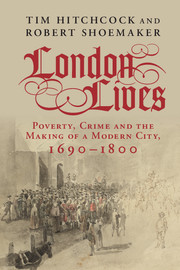Book contents
- Frontmatter
- Dedication
- Contents
- List of figures
- Preface
- Acknowledgements
- List of abbreviations
- 1 Introduction
- 2 Beggarman, thief: 1690–1713
- 3 Protest and resistance: 1713–1731
- 4 Vestries, justices and their opponents: 1731–1748
- 5 Reformers and their discontents: 1748–1763
- 6 Finding a voice: 1763–1776
- 7 The state in chaos: 1776–1789
- 8 Epilogue: The 1790s
- Bibliography
- Index
- References
2 - Beggarman, thief: 1690–1713
Published online by Cambridge University Press: 05 December 2015
- Frontmatter
- Dedication
- Contents
- List of figures
- Preface
- Acknowledgements
- List of abbreviations
- 1 Introduction
- 2 Beggarman, thief: 1690–1713
- 3 Protest and resistance: 1713–1731
- 4 Vestries, justices and their opponents: 1731–1748
- 5 Reformers and their discontents: 1748–1763
- 6 Finding a voice: 1763–1776
- 7 The state in chaos: 1776–1789
- 8 Epilogue: The 1790s
- Bibliography
- Index
- References
Summary
Introduction
In the spring of 1704 the governors of the London Workhouse were confronted by one of the uncomfortable realities generated by a rapidly growing city. Two brothers, Thomas and John Brinnish, had been taken up from the streets and brought before them, where they informed the governors that the churchwarden of their home parish in Bristol had given the brothers three shillings and directed them to the charity of Londoners. Thirty years earlier they would almost certainly have simply been whipped and sent on their way. However, in an increasingly bureaucratic system, the governors first wrote to the keeper of the workhouse at Bristol for more information. In the process, the Brinnish brothers were inducted into a system of vagrant and pauper removal, itself part of an evolving bureaucracy of poor relief and criminal justice that was changing in response to legislation, civic innovation and the actions of the reformation of manners societies. These in turn had been prompted in part by the 1688 Revolution, which led to more frequent meetings of parliament and the growth of voluntary societies seeking reform.
Whether the Brinnish brothers were aware of and consciously took advantage of the new opportunities these innovations accorded the poor is unknown, but by their actions plebeian Londoners both forced the pace of change and took advantage of the new opportunities that arose. Driven by economic hardship, the poor and the criminal brought substantial pressures to bear on the institutions of relief and justice in the 1690s. Both the amount spent relieving poverty and the number of crimes prosecuted rose in the decade after 1688. In the small City parish of St Dionis Backchurch, expenditure peaked in 1694 at £582, a figure that would not be reached again for over four decades, and in the ten years after 1690 expenses averaged £414 per annum. Rising rates of criminal prosecutions reveal a crisis of gender, prompted by the imbalance in migration which saw a large number of young, unmarried women in the metropolis, whose independent status rendered them quickly suspected of theft and sexual immorality. Driven in part by the recruitment of men into the armed forces, prosecutions of women reached historically unprecedented levels.
- Type
- Chapter
- Information
- London LivesPoverty, Crime and the Making of a Modern City, 1690–1800, pp. 27 - 69Publisher: Cambridge University PressPrint publication year: 2015



